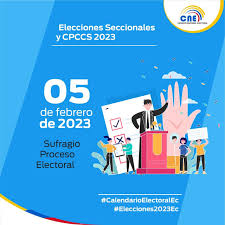Seven days after the regional elections and the elections of the Council of Citizen Participation and Social Control (the “fifth power”) and a popular consultation of eight questions, with which the neoliberal government of Guillermo Lasso tried to regain lost credibility, appealing to the narrative against drug trafficking and corruption, the defeat for the government and its party, CREO, was resounding.
The campaign that occupied the first weeks of the year in the streets of the country and in the media was the campaign for a YES to the consultation questions. The direct messages of fear for insecurity, drug trafficking, assembly members who do not work, corrupt judges, in short, everything that common sense indicates should be supported, were everywhere. The polls, even those with the most credibility and independence, and even on polling day itself, gave a victory to the YES. In that scenario, what was happening in the campaigns for mayor, prefectures (provincial authorities) and, even worse, for the seats of the “fifth power”, lost importance. To tell the truth, even those of us who campaigned for the NO, in many places, thought we would lose… but we won!
Analysts, with different nuances, agree on key issues. Lasso and his party are left without any political force. Not only did they lose the referendum by a landslide, they also lost mayorships, councils and prefectures. They have one left in one of the Amazonian provinces. The second major defeat was suffered by the Social Christian Party with the spectacular loss of the mayoralty of Guayaquil, the second most important city in the country, and also the government of the province of Guayas. Two bastions that this right-wing party had held for almost 30 consecutive years. Clearly, the elections are a blow, I dare not say a death blow because the right wing usually finds ways to resurrect itself, but a blow from which it will be difficult for them to recover soon. A blow to the process of deepening the accumulation of power in the hands of businessmen, bankers and the Ecuadorian oligarchy, which has been going on since Lenin Moreno’s presidential term, immediately prior to the present one.
On the other hand, also undeniable, the Revolución Ciudadana, the movement that brought Rafael Correa to power, turned out to be the big winner of the sectional elections. It won 8 out of 23 prefectures and five capital cities, including Quito and Guayaquil, as well as approximately 60 mayoralties throughout the country. The Pachakutik Movement, linked to the Coordinating Body of Indigenous Nationalities of Ecuador (Coordinadora de Nacionalidades Indígenas del Ecuador-CONAIE), swept mayoralties and prefectures in the central highlands, an area with a very high indigenous population. One of these mayorships, that of Ambato, was won for the first time in history by an indigenous woman. As for the Council for Citizen Participation and Social Control, unfortunately, it has to be said that it was won by null and blank votes: it was not known who was who or why they were running. Seen in perspective, this could be a great loss for democracy, since it is there, in the so-called “fifth power”, that autonomy and independence are sought for the election of key state authorities such as the attorney general and the ‘Pocurador/a’ general. It remains to be seen what will happen to those who will take on the task with so little legitimacy backed by the vote.
But beyond these results and their obvious significance, what are the Ecuadorian people saying to us with this vote? Here are some things that, at least to me, they say.
- That they are not a people without memory, nor are they naïve, and that, although without sophisticated narratives, they are aware of the deceit of the elites and that they live in their own flesh and day by day, the systematic loss of conquered rights, the weakening of a state that had already gained institutionality and had managed to improve basic living conditions, open paths to the solution of vital needs of large majorities, and had strengthened the public sector. It is only necessary to have lived in the country for the last 15 years to see the difference. It is not a question of ideology; it is a question of experience.
- That it does not want the path that has been mapped out for it for about 7 years and has already said so in many ways in the popular mobilisations that have been successively repressed and ignored by the last two governments. Well, since the installed power did not listen to what it had to listen to in the mobilisations… the ballot boxes spoke and there, repression does not work. What will the neoliberal power do then in the next two years? How will it deal with this electoral result? What ways will it find to sustain itself?
- That it does not buy narratives of fear because poverty, the weakening of public health, the permanent risk to the pension system, the abandonment of the countryside… and none of this has anything to do with drug trafficking, which is gaining ground due to the total absence of the state and, moreover, with the acquiescence of the state itself.
- It does not disregard the powers that be, which are fully installed in political power… but it recognises the power it has gained through sustained resistance, which is now reflected in the ballot boxes and is changing the scenario of political and social forces in the country.
It is a great moment; these are great lessons. Now, we have to see how to continue gaining ground on a horizon of guaranteed rights, distribution of wealth, elimination of poverty, depatriarchalisation, in short, on that horizon that the country and the continent have been dreaming of for years, despite those who want to turn it into a nightmare.






